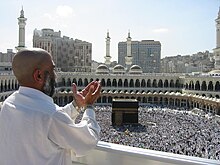Duʿā '
Duʿā ' ( Arabic دعاء, DMG Du'ā' , invocation, Please ') referred to in Islam , the personal form of supplication or thanks to prayer . A Duʿā 'can be said at any time of the day or night, in contrast to salāt , the ritual prayer that is prescribed to the Muslim at fixed times. One can also draw a clear demarcation from the Dhikr , which is more inwardly directed, while the Duʿā 'encloses a formulated request.
Koranic statements
In the Koran there are several statements about Duʿā 'as a request and invocation. The term Daʿwa also appears as a synonym for Duʿā ' . Abraham ( Sura 14 : 39) and Zacharias ( Sura 3 : 38f.) Praise God for having heard their Duʿā '. God himself also says of himself: "I hear the request of the supplicant when he asks me" ( Sura 2 : 186). In this way God differs from all other beings who call on people, because they do not answer their Duʿā '( Sura 35 : 14). In Sura 13:14 declares that the true invocation ( daʿwat al-ḥaqq ) is due to God alone , while the invocation of other beings or forces of nature is useless. Man is reprimanded for not getting tired of asking God for good when things go badly, but then turning away from him when God shows him grace (41:49; 41:51).
The Koran also contains statements about the manner in which God is invoked. Thus it says in sura 7:55 "Call on your Lord in humility and in secret; behold, he does not love those who commit transgressions." When invoking, the human being should adjust his faith completely to God ( Sura 40 : 65). And in sura 7: 180 people are asked to call on God by his most beautiful names .
The Duʿā 'is also mentioned in many hadiths , and many traditionarians and legal scholars have emphasized its importance in their works.
Rules for the Duʿā '
You can formulate a Duʿā 'for yourself, for someone else, or as protection from someone else. In supplication, the Muslim has a free choice of words, but Koranic texts or excerpts from traditions according to the Prophet are often used. The recommendation for the Duʿa is often accompanied by certain recommended conditions and manners ( adab ) in order to ensure the greatest possible chance of acceptance of the requested person. The conditions u. a. called:
- only products eat the halal are
- be sure to accept the request
- Don't be distracted at Duʿa
- the requested should not lead to sin, cause hostility between family members, or violate the rights of a Muslim
- Don't ask for something (logically) impossible, as this represents a lack of respect for God
The manners include:
- choose the best times and a. during prostration in prayer , between Adhan and Iqama
- perform the ritual ablution beforehand , precede the supplication by the obligatory prayer and the admission of one's own wrong deeds and repentance about them
- in direction of prayer position
- raise your hands to the sky
An important aspect of the Duʿa for the Muslim are the basmala at the beginning and the blessings for the prophet Mohammed .
See also
literature
- L. Gardet: Art. "Duʿāʾ" in The Encyclopaedia of Islam. New Edition Vol. II, pp. 617a-618b.
- Yasir Qadhi: Duʿa - the believer's weapon . Islamic Library , Düsseldorf 2009, ISBN 978-3-941111-05-9
- Fritz Meier: The blessing over Mohammed in supplication and supplication. in: Newspaper of the German Oriental Society, Vol. 136, 1986, p. 364
- Elhadi Essabah: “Call to me and I will answer you” (Sura 40,60). Meaning and meaning of supplication in Islam. In: Hansjörg Schmid / Andreas Renz / Jutta Sperber (eds.): "In the name of God ..." Theology and prayer practice in Christianity and Islam , Verlag Friedrich Pustet, Regensburg 2006, ISBN 978-3-7917-1994-8 ( Theological Forum Christianity - Islam ), pp. 91-103.
